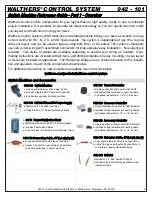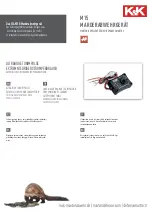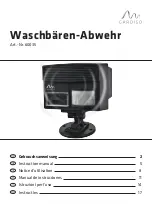
WALTHERS
®
CONTROL SYSTEM
Switch Machine Reference Guide - Part 1 - Overview
942-101 Switch Machine ©2018 Wm. K. Walthers Inc., Milwaukee WI 53218
942 - 101
3
1.0 Switch Machine Overview
The Walthers Switch Machine is a servo based slow mo-
tion device and includes microcontroller based electronics
offering a flexible mix of control options allowing easy inte-
gration into control panels of virtually any design. The con-
trol circuitry may be powered from a 10 to18 volt filtered
DC power supply or from a standard DCC booster output.
Both dual and single LED fascia controllers are available.
Each controller features a symmetrical design both me-
chanically and electrically. The controllers may be in-
stalled in either direction and the electrical connection
flipped to properly indicate for left and right handed turn-
outs. The single and dual controllers can also be com-
bined for use with either left or right handed crossovers.
The switch machine may also use existing single or dual
momentary pushbuttons, as well as SPST or SPDT toggle
or rotary switches to control turnout position. If DC power
is used, an option allows the machine to follow the DC
power input polarity, allowing emulation of a standard stall
motor device controlled via a DPDT reversing switch.
When DCC power is used, accessory decoder commands
may be used to control the turnout.
Digital logic compatible inputs and outputs are also availa-
ble allowing integration with other layout control systems.
The switch machine also includes two integrated micro
switches which can be dedicated to other functions such
as switching frog power, signals or other layout feedback
functions. These switches are independent from all switch
machine electronics and can be used as a break-before-
make circuit as the switch machine transits from the nor-
mal and reverse positions.
The design of the switch machine electronics allows any of
the control options to be used with no reconfiguration re-
quired by the user. In many cases, multiple inputs may be
used simultaneously and toggle switch or digital inputs will
override the standard fascia controls and provide the ability
to remotely disable local turnout control via the pushbutton
inputs.
There are several user selectable options available to
modify the switch machine behavior if needed:
Power Route — Allows a DPDT switch in the DC power
input to determine switch position in lieu of control switch-
es or buttons.
Lock Enable — Changes the POS IN terminal to LOCK
IN, disabling local control inputs when active.
Color Mode — Changes colors displayed for each turn-
out position on standard fascia controllers.
Speed — Changes throw speed from default 1 second
to 3 seconds. Optional resistor may be used to set
speed to any value between 1/2 and 5 seconds.
Swap — Exchanges switch machine normal and reverse
positions, allowing the switch machine to be installed in
either orientation to the turnout independent of left or
right-handed operation.
The switch machine uses a self-locking mechanism to con-
vert the servo rotation into linear actuator wire motion.
Servo rotation is fixed and independent of the throw dis-
tance and tension adjustment. In addition the point tension
is provided by the actuator wire, not from the servo, so the
switch machine may be continuously operated into a
jammed point without risk of damage or overload. Strong,
self-lubricating Delrin is used for all plastic components
allowing the switch machine to provide years of reliable
trouble-free operation.
A complete system of fascia controls and indicators can be
combined with the switch machines and power supply us-
ing pre-made cables and provide easy plug-and-play in-
stallation requiring no soldering, cutting or difficult wiring.
The switch machine and controllers include drilling tem-
plates and spacers to facilitate the design and construction
of layout controls for ease of use and uniform clean ap-
pearance.
Each component is complete with connecting cables,
mounting and drilling templates for easy installation. Ex-
tension cables are available to extend the connections to
fascia controls and power supply if needed.
A drill set is available with all sizes needed to mount the
switch machine to the layout benchwork and controller but-
tons and indicators to fascia control panels. The switch
machine is designed to integrate seamlessly with other
components of the Walthers Control System and provides
a versatile system for both control panel design and turn-
out control.




















